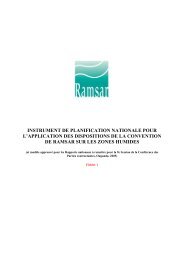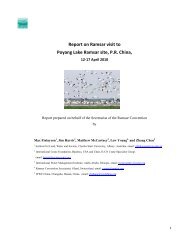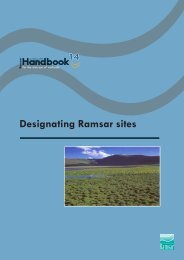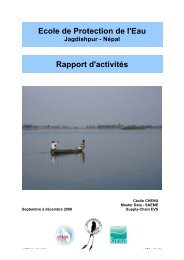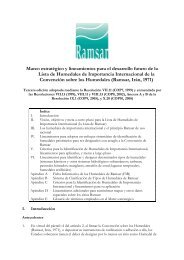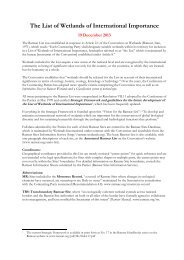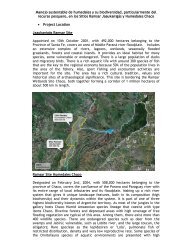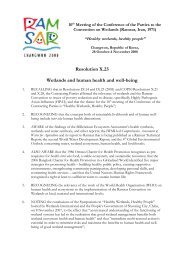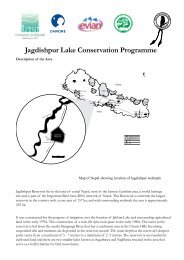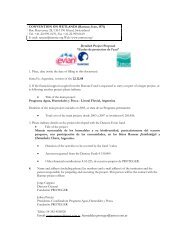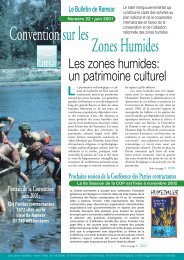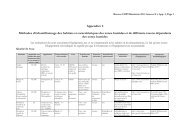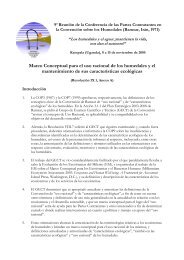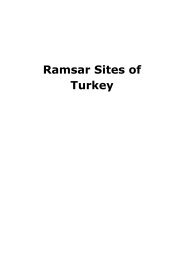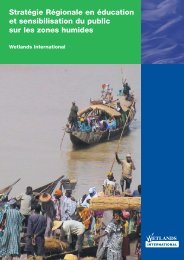Guidelines for the Rapid Ecological Assessment - Convention on ...
Guidelines for the Rapid Ecological Assessment - Convention on ...
Guidelines for the Rapid Ecological Assessment - Convention on ...
Create successful ePaper yourself
Turn your PDF publications into a flip-book with our unique Google optimized e-Paper software.
GUIDELINES FOR THE RAPID ECOLOGICAL ASSESSMENT OF BIODIVERSITY IN INLAND WATER, COASTAL AND MARINE AREAS<br />
<str<strong>on</strong>g>the</str<strong>on</strong>g> assessment. There<str<strong>on</strong>g>for</str<strong>on</strong>g>e, <str<strong>on</strong>g>the</str<strong>on</strong>g> available capital <str<strong>on</strong>g>for</str<strong>on</strong>g> a given assessment is ei<str<strong>on</strong>g>the</str<strong>on</strong>g>r limited, meaning that it<br />
can be c<strong>on</strong>sidered limiting, or less than <str<strong>on</strong>g>the</str<strong>on</strong>g> amount desired to carry out <str<strong>on</strong>g>the</str<strong>on</strong>g> objectives of <str<strong>on</strong>g>the</str<strong>on</strong>g> project, or<br />
ample, meaning that <str<strong>on</strong>g>the</str<strong>on</strong>g>re is enough m<strong>on</strong>ey to carry out all elements of <str<strong>on</strong>g>the</str<strong>on</strong>g> assessment in a scientifically<br />
sound and usable way.<br />
Expertise<br />
An expert is some<strong>on</strong>e who, <str<strong>on</strong>g>for</str<strong>on</strong>g> example, can identify specimens of a tax<strong>on</strong>omic group to <str<strong>on</strong>g>the</str<strong>on</strong>g> species<br />
level, is familiar with current sampling and collecti<strong>on</strong> methods, can analyse data, and is familiar with <str<strong>on</strong>g>the</str<strong>on</strong>g><br />
tax<strong>on</strong>omic group within a larger biological and ecological c<strong>on</strong>text. It does not refer to people with a general<br />
understanding or basic knowledge in <str<strong>on</strong>g>the</str<strong>on</strong>g> field. It is important to determine <str<strong>on</strong>g>the</str<strong>on</strong>g> availability of<br />
experts <strong>on</strong> a local, regi<strong>on</strong>al and internati<strong>on</strong>al level. Local expertise is a great resource when it is available.<br />
Often local experts will have a good understanding of local geography, ecology, and community issues.<br />
However, if <str<strong>on</strong>g>the</str<strong>on</strong>g>re is no local expert, an expert from outside <str<strong>on</strong>g>the</str<strong>on</strong>g> locality or regi<strong>on</strong> may need to be brought<br />
in. In highly specialized cases <str<strong>on</strong>g>the</str<strong>on</strong>g>re may <strong>on</strong>ly be a small number of people, or even just <strong>on</strong>e pers<strong>on</strong>, who<br />
can be c<strong>on</strong>sidered an expert in <str<strong>on</strong>g>the</str<strong>on</strong>g> area of study.<br />
Instituti<strong>on</strong>al support refers to <str<strong>on</strong>g>the</str<strong>on</strong>g> use of technical facilities <str<strong>on</strong>g>for</str<strong>on</strong>g> analysis, storage of data, and o<str<strong>on</strong>g>the</str<strong>on</strong>g>r <str<strong>on</strong>g>for</str<strong>on</strong>g>ms of<br />
support. Determinati<strong>on</strong> of <str<strong>on</strong>g>the</str<strong>on</strong>g> available expertise should include a c<strong>on</strong>siderati<strong>on</strong> of <str<strong>on</strong>g>the</str<strong>on</strong>g> instituti<strong>on</strong>al support<br />
that is available, as this may present a limitati<strong>on</strong> to <str<strong>on</strong>g>the</str<strong>on</strong>g> capacity and scope of any project. In deciding<br />
<strong>on</strong> what <str<strong>on</strong>g>for</str<strong>on</strong>g>m of rapid assessment is feasible, it is important to determine whe<str<strong>on</strong>g>the</str<strong>on</strong>g>r individuals who are<br />
experts in <str<strong>on</strong>g>the</str<strong>on</strong>g> field of study (including local experts) are or are not available <str<strong>on</strong>g>for</str<strong>on</strong>g> <str<strong>on</strong>g>the</str<strong>on</strong>g> assessment project.<br />
7.2 Scope<br />
The scope requires a c<strong>on</strong>siderati<strong>on</strong> of <str<strong>on</strong>g>the</str<strong>on</strong>g> scale of various elements of an assessment. How much area<br />
does <str<strong>on</strong>g>the</str<strong>on</strong>g> assessment cover? How many species will be sampled? How much data will be collected? How<br />
many sites will be sampled?<br />
In general <str<strong>on</strong>g>the</str<strong>on</strong>g> scope of a rapid assessment is c<strong>on</strong>tingent up<strong>on</strong> <str<strong>on</strong>g>the</str<strong>on</strong>g> purpose and resources of <str<strong>on</strong>g>the</str<strong>on</strong>g> assessment.<br />
Ample resources allow <str<strong>on</strong>g>for</str<strong>on</strong>g> proporti<strong>on</strong>al increases in <str<strong>on</strong>g>the</str<strong>on</strong>g> scope of various parts of an assessment.<br />
It is difficult to have an extensive geographic scope <str<strong>on</strong>g>for</str<strong>on</strong>g> a two-day assessment <strong>on</strong> a tight budget. In this<br />
respect some aspects of <str<strong>on</strong>g>the</str<strong>on</strong>g> scope are related to <strong>on</strong>e ano<str<strong>on</strong>g>the</str<strong>on</strong>g>r as well. For example, it could be possible to<br />
survey a broad geographic area in two days if <str<strong>on</strong>g>the</str<strong>on</strong>g> scope of <str<strong>on</strong>g>the</str<strong>on</strong>g> site selecti<strong>on</strong> and data collecti<strong>on</strong> were both<br />
highly reduced. In general, if <str<strong>on</strong>g>the</str<strong>on</strong>g> resources <str<strong>on</strong>g>for</str<strong>on</strong>g> an assessment are ample, <str<strong>on</strong>g>the</str<strong>on</strong>g> scope becomes entirely<br />
dependent <strong>on</strong> <str<strong>on</strong>g>the</str<strong>on</strong>g> purpose and objectives of <str<strong>on</strong>g>the</str<strong>on</strong>g> project.<br />
The scope of an assessment can vary internally in <str<strong>on</strong>g>the</str<strong>on</strong>g> following areas: taxa, geography, site selecti<strong>on</strong>,<br />
sampling, and data analysis. Each of <str<strong>on</strong>g>the</str<strong>on</strong>g>se should be c<strong>on</strong>sidered separately. For example, a given assessment<br />
project may have a broad geographical scope, covering an expansive area, while <str<strong>on</strong>g>the</str<strong>on</strong>g> tax<strong>on</strong>omic<br />
scope could be quite focused, c<strong>on</strong>centrating <strong>on</strong> a limited number of tax<strong>on</strong>omic groups.<br />
Tax<strong>on</strong>omic scope<br />
The tax<strong>on</strong>omic scope depends up<strong>on</strong> how many and which tax<strong>on</strong>omic groups will be involved in <str<strong>on</strong>g>the</str<strong>on</strong>g> study.<br />
29



